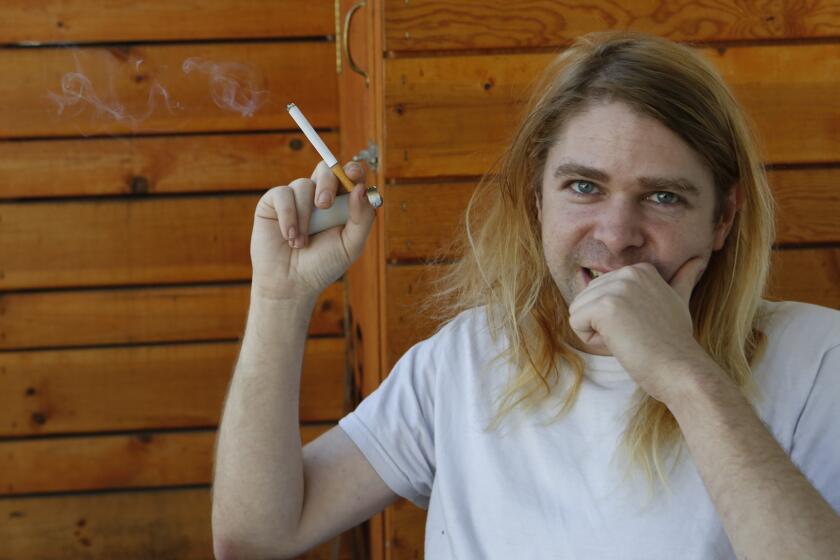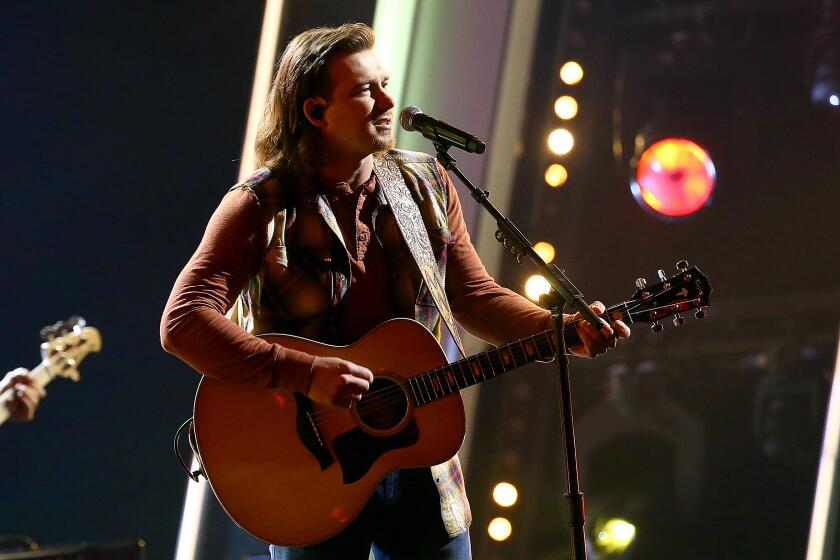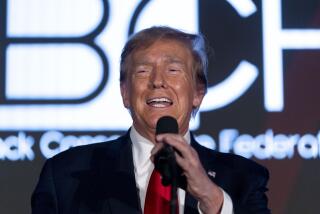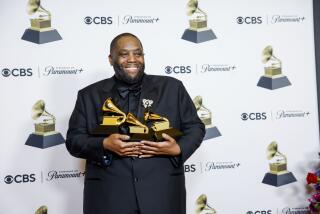Trump reportedly considering pardons for rappers Lil Wayne and Kodak Black
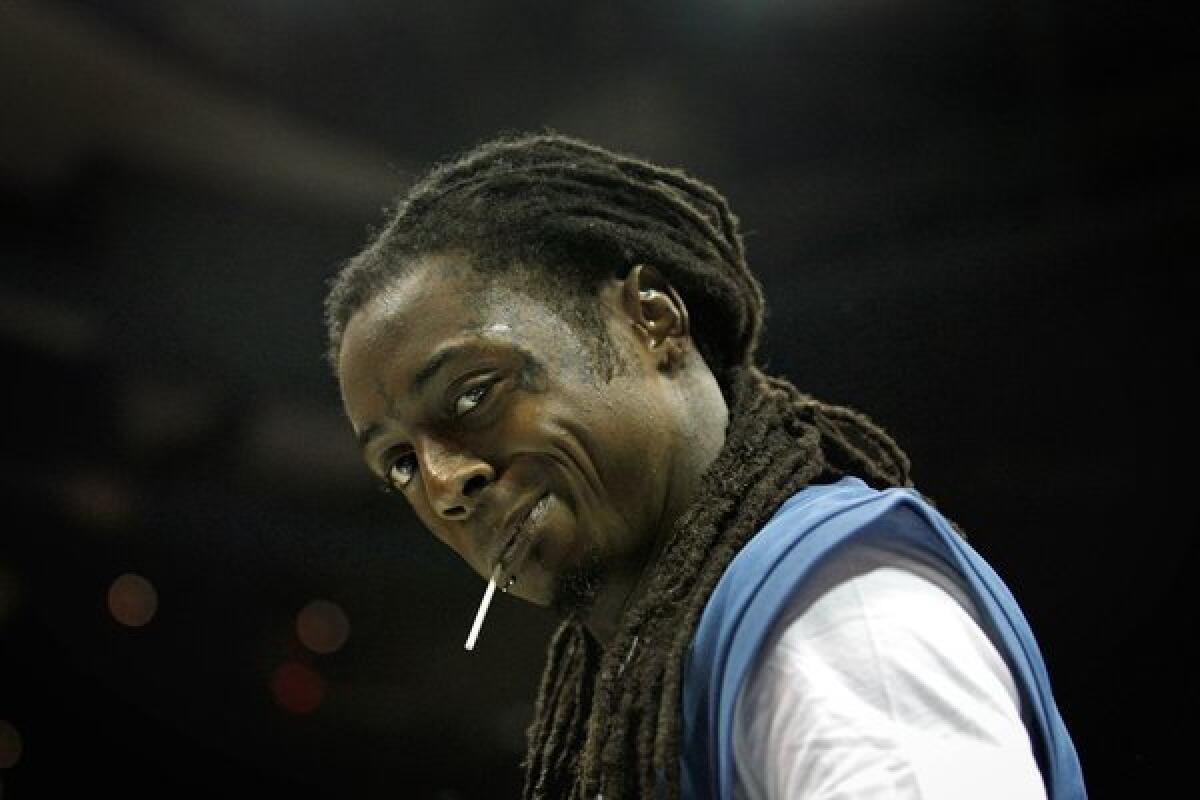
When, seemingly out of nowhere, famed New Orleans rapper Lil Wayne, who was born Dwayne Carter, took to Twitter a week before the November election to endorse President Trump, many of his fans were blindsided.
“President Carter with President Trump,” read the boastful tweet above an image of the two side by side giving the thumbs-up. The next day at an event outside the White House, Trump described Wayne as “an activist in a really positive way.”
Had Wayne pulled a Kanye and gone MAGA? Was a Weezy ’24 campaign in the offing? Nope. Behind the scenes, the 38-year-old rapper was facing a possible 10-year prison term on gun charges stemming from a December 2019 incident in Miami, and the post appears to be the first piece of a multistage effort to win the president’s favor. The end game? A presidential pardon.
Indie musician Ariel Pink has been dropped by his label after confirming he attended the Trump rally that led to a mob violently storming the Capitol.
Two months later, Lil Wayne is being considered for a pardon, according to a report published by Bloomberg. As well, another hit-making rapper already serving time on gun charges, Kodak Black, who praised Trump before the election, is in the running for a pardon.
How did two artists who had never before spoken positively about Trump’s politics land on American convicts’ most exclusive — and legally binding — list?
Under most recent presidents, there have been two ways to get a pardon, says Dr. Jeffrey Crouch, assistant professor of American politics at American University and author of “The Presidential Pardon Power.” The first is to apply to the Office of the Pardon Attorney in the Department of Justice. The other way is to get into the ear of the president. “President Trump has apparently worked outside the Pardon Attorney for many of the clemency grants he has made, so for him the second option is probably more likely to succeed.”
Wayne has been shockingly transparent in his efforts to get a pardon for his 2019 arrest. After an anonymous tip two days before Christmas more than a year ago, authorities searched his private jet after it landed in Miami. Among his possessions, they found a gold-plated, pearl-gripped .45-caliber Glock, ammunition and drugs including cocaine, heroin, MDMA, prescription-strength cough syrup and painkillers. As a convicted felon, Wayne is barred from possessing a firearm. He said the gun was a gift.
Aware that he could be sent to prison for having the Glock — he wasn’t charged in connection with the drugs — the rapper met with Trump on Oct. 29 regarding a Trump administration initiative called the Platinum Plan, which is aimed at enabling Black-owned businesses easier access to capital. Lil Wayne wrote afterward: “Just had a great meeting with [Donald Trump] besides what he’s done so far with criminal reform, the platinum plan is going to give the community real ownership. He listened to what we had to say today and assured he will and can get it done.”
Many of his fans were apoplectic. The rapper was an expert at speaking truth to power, at least when he wanted to. Most famously, on “Georgia Bush,” his indictment of President George W. Bush’s response to Hurricane Katrina, Wayne rapped: “I was born in the boot at the bottom of the map / New Orleans baby, now the White House hating / Trying to wash us away like we not on the map.”
On Dec. 11, Wayne pleaded guilty to one count of possessing a firearm and ammunition as a felon. Unless Trump intervenes with a pardon before Jan. 20, Wayne will be sentenced Jan. 28 and faces up to 10 years in prison.
Morgan Wallen made news in 2020 for breaking streaming records and for getting uninvited to “SNL” for maskless partying. His new double album is “Dangerous.”
Long considered one of the position’s most powerful legal authorities, a president’s ability to pardon is limited to those charged with or convicted of federal crimes. It’s also a kind of ritual. Before he left office, Barack Obama granted hundreds of pardons to low-level drug offenders and those serving unreasonable sentences for drug-related convictions. All told, Obama pardoned and granted clemency to nearly 2,000 people during his eight years in office. George W. Bush did the same for 200 people across his two terms.
Various means, including spending money at a Trump property or getting through to him on Fox News, have been employed to catch the president’s attention, Crouch says. Even the imprisoned star of a Netflix reality series has made a go of it: “One of the more aggressive moves was made by Joe Exotic, who put up a billboard in Florida where Trump could see it.” Rappers may have a leg up. Before he was elected president, Trump’s name had long been used in rap lyrics as a flattering synonym for extreme wealth.
So far, Trump has granted pardons to a total of 70 people, including Paul Manafort, Roger Stone, George Papadopoulos and Gen. Michael Flynn, all of whom were convicted of crimes committed during the run-up to or aftermath of the 2016 election. Trump also pardoned four Blackwater guards found guilty in the killing of Iraqi civilians.
In 2018 Trump granted relief to Alice Johnson, who had been imprisoned for 21 years for a first-time drug offense. He first commuted her sentence in 2017 a week after meeting with Kim Kardashian West, who was advocating on Johnson’s behalf. Last year Trump delivered Johnson a full pardon. Trump is expected to issue more reprieves before he leaves office next week, and has indicated that he may attempt to pardon himself.
A few days before Lil Wayne’s endorsement, Floridian rapper Kodak Black, who was born Dieuson Octave but later changed his legal name to Bill Kahan Kapri, also made positive mention of Trump in a tweet. Tagging the president, Kodak, 23, wrote, in part, “What do you think of the ‘Platinum Plan?’ ... This is what the community needs.... more ownership.” He concluded by saying, “I want to help with justice reform when I am out as well.”
Black posted the missive from prison, where he’s serving 46 months and hoping to be pardoned for firearms possession. His jail time came after agents found him with a Glock during a search at the Canadian-American border. Another gun registered in his name was used at a crime scene and traced back to the rapper. Authorities later learned that the artist had lied on his background check when buying the guns.
A prodigious rapper who earned a huge following for tracks including “Zeze,” “Roll in Peace” and “Wake Up in the Sky,” since his rise in the mid-’10s, Black seems to have spent nearly as much time in court as in the studio. Before he turned 20, he’d been accused in several jurisdictions of rape, sexual violence, burglary, false imprisonment of a child and gun possession. Three years ago he was arrested on suspicion of child endangerment after he posted to Instagram a clip of drugs and a pistol near a toddler.
Black hired Bradford Cohen as his attorney. The Broward County-based lawyer has personally interacted with the Trump clan; in 2009 he was a contestant on “Celebrity Apprentice.” For the past week, Cohen has taken to Twitter to rally Trump on his client’s behalf. Cohen amplified support from Black’s famous fans and peers including Yo Gotti, Jake Paul, Lil Yachty and Lil Pump, adding #freekodak to the end of each. Whether the insurrection Wednesday at the Capitol building changes the equation is not yet known.
Representatives for Lil Wayne and Black haven’t responded to requests for comment.
Such public petitioning isn’t new. Before her pardon, heiress Patricia Hearst, convicted of her role in a series of bank robberies after being kidnapped by a guerrilla group, wore a T-shirt that read “Pardon Me” in public appearances. President Clinton pardoned her as he was leaving office in 2001.
Presidential pardon expert Crouch also notes the rappers wouldn’t be the first musicians spared prison time: “John F. Kennedy pardoned Hampton Hawes, a jazz piano player [and] Jimmy Carter pardoned Peter Yarrow of Peter, Paul and Mary.” Add in President Reagan’s pardon of New York Yankees owner George Steinbrenner, President George W. Bush’s commutation of Fugees songwriter and producer John Forte’s prison sentence and Obama’s pardon of Studio 54 co-owner Ian Schrager’s conviction, and Trump’s potential move seems less unprecedented.
Crouch stressed, though, that Trump’s approach has been different from his recent predecessors of both political parties. “Most pardon recipients under Bush and Obama were largely unknown people without an apparent connection to the president,” he says. “Many of Trump’s pardons have gone to his political allies, supporters and people who have a connection to him.”
More to Read
The biggest entertainment stories
Get our big stories about Hollywood, film, television, music, arts, culture and more right in your inbox as soon as they publish.
You may occasionally receive promotional content from the Los Angeles Times.
